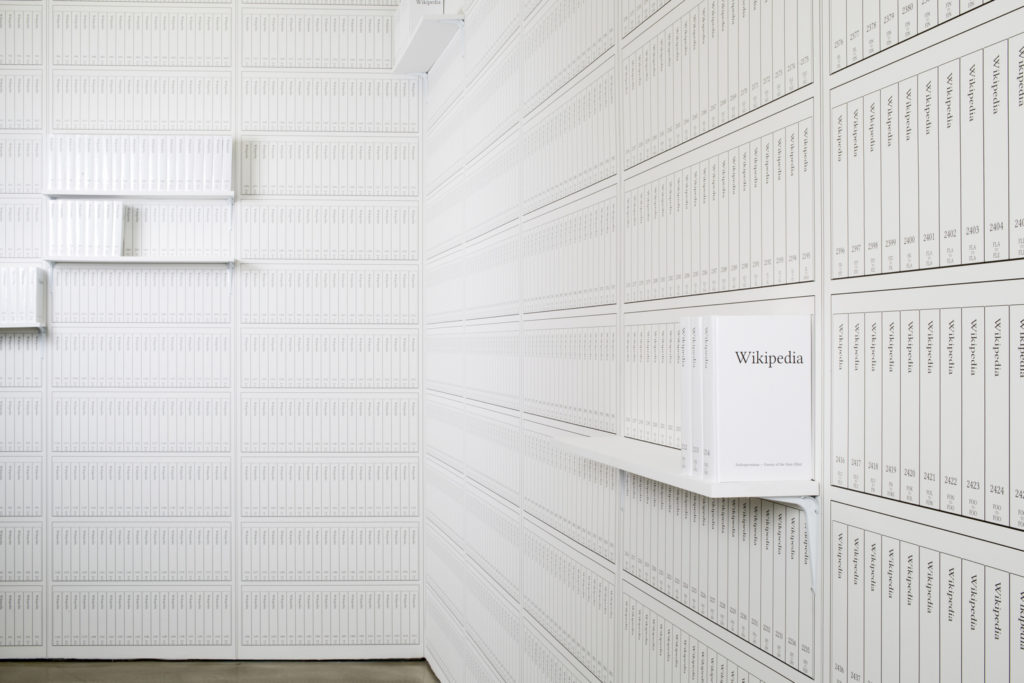MICHAEL MANDIBERG
DENNY GALLERY
By Jennifer W. Leung, printed in the October issue.

For Michael Mandiberg’s “From Aaaaa! to ZZZap!” at Denny Gallery, the artist displayed a limited run of his Print Wikipedia project, 2015, which makes the online encyclopedia available in proprietary print-on-demand form. Several individual print copies and volumes titled Table of Contents and Contributor Appendix were shelved against a monochromatic wallpaper, these were accompanied by the real-time projection of file conversion and upload to the self-publishing distribution platform Lulu.com. The space had the feel of a leasing office for modish apartments or the generic-brands aisle of a suburban grocery store, its simulacra papering over the vast amount of work—affective, manual, and computational—required to bring the project into being.
However, on the second day of the show’s continuous forty-eight-hour opening, a programmer labored on a laptop on the floor, correcting upload glitches that would extend the exhibition by a week. On this day, the visitor’s difficulty in reading the washed-out Lulu.com live stream was superseded by the instability of the upload script, which tended to crash periodically. The illegal characters on the “savage” work space of the floor transformed the gallery into a problematic “gray room,” neither white cube nor black box. But the exhibition was merely one facet of Print Wikipedia’s media environment, which includes tweets from @PrintWikipedia time-stamping the successful upload of each volume, an online Vimeo walk-through, and this spring’s “Art + Feminism Wikipedia Edit-a-thon,” a more politicized project cofounded by Mandiberg and staged at the Museum of Modern Art in New York. The exhibition also acted as frontispiece for an infrastructural environment of gizmos, cell towers, undersea fiber optics, and wasted material, which together comprised the show’s physical context.
For the viewer, the experience might have been reduced to three actions: upload, hashtag, and browse. If the upload produces a memorial to Wikipedia’s ever-changing content, already obsolete at the time of publication, the hashtag #printwikipedia and the trial-by-crowd Twitterverse elide the hegemonic informational network policed by the volunteer editors of Wikipedia. Browsing the show, on the other hand, one found one’s cognitive processes of attention, association, and memory challenged. The pleasure of handling words caught between affirmation and doubt, between the Oxford English Dictionary and Avital Ronell’s Telephone Book, in the viewer’s physical performance of heretofore only digital annotation and association, cannot be discounted. It is a Taylorist diagram of strange efficiencies and a nostalgia for language.
Sometime in an on-demand future, Print Wikipedia promises a set of material facts to counterpose data measures of the human-machine interface, i.e., 140-character tweets and the world record for information transfer over a single fiber-optic cable of forty-three terabytes per second. The 5,244,111-page set of 7,473 volumes would supplant the approximate distance of a 400-meter dash, a distance run by the female world-record holder at 8.4 meters per second. Between terabit and meter lies a theater of confrontation between finite bodies and big data.
If “From Aaaaa! to ZZZap!” refers broadly to cognition and culture, it also refers to artistic precedent. As a postlanguage environment, the show gained by comparison to On Kawara’s “Today” series, 1966–2013; Goldin+Senneby’s M&A, 2013, made with the investment banker Paul Leong; and Ying Miao’s Blind Spot, 2007. However, as a process and mnemonic-based work, the exhibition lacked the critique of Hans Haacke’s exhibition “Information,” 1970, at MoMA, or Micha Ullman’s Bibliothek, 1995. Instead, the show seamlessly integrated with the extant infrastructures of our era, while simultaneously posing as a weighty, obdurately material reminder of information’s earlier, increasingly obsolete forms.
